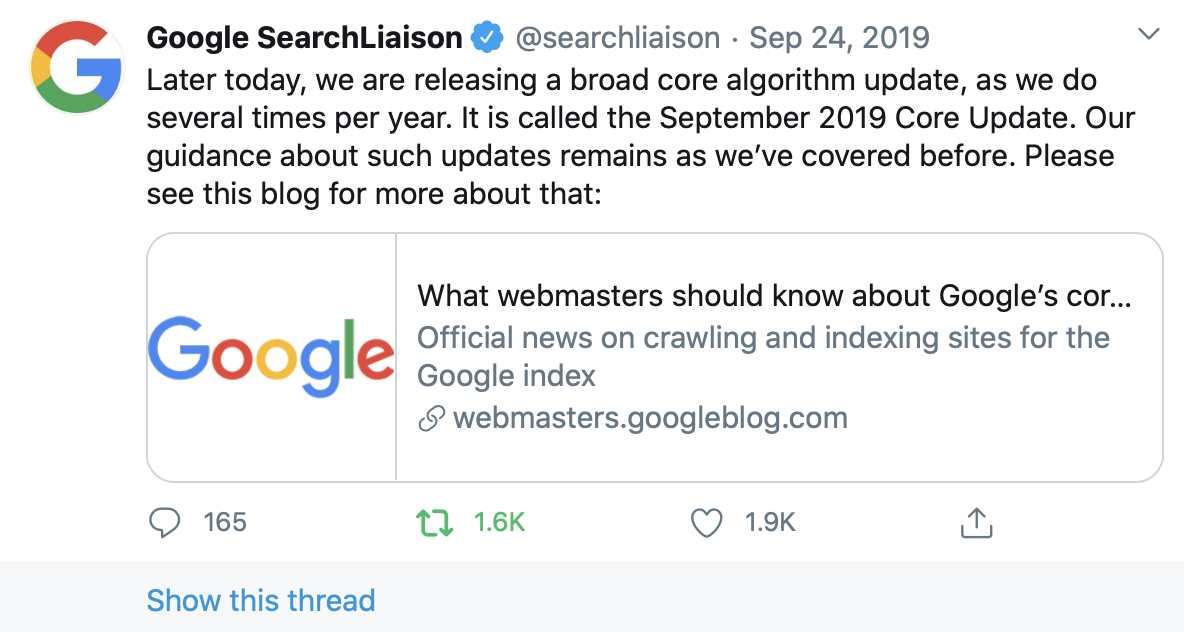In the quest for visibility on Google's first page, you're likely aware of the significance of staying informed about the latest Google core updates. Perhaps your colleagues have already alerted you about the recent 'September core update' and its potential impact on your page rankings. However, it's crucial to delve deeper into how Google evaluates content. What constitutes a Google core update, and how does it influence your content's performance in search results? Let's embark on a journey of understanding!
A phrase that instils unease: Google core updates and their potential impact
It's a phrase that has started to evoke trepidation within marketing departments. An email lands in their inboxes, or their agency includes a 'Google core update' on the meeting agenda. Suddenly, a sharp intake of breath ensues, swiftly followed by a hurriedly arranged phone call, with the initial questions being, 'What will be the repercussions?' and 'What can we do to address this?' However, I firmly believe that you should perceive Google core updates as an opportunity to refocus on how you fulfil your content strategy and ensure the production of engaging top-quality content.
 A tweet from Google Search Liaison from 24 September 2019
A tweet from Google Search Liaison from 24 September 2019
A fundamental principle that guides my content creation approach is the emphasis on creating content that resonates with 'real people.' In today's digital landscape, where many individuals focus on tailoring content for algorithms, producing content with genuine human appeal is even more crucial than any Google core update.
Regular updates vs core updates: Unveiling the distinction
But what precisely do Google updates entail, and how do regular updates differ from core updates? Let's take a step back and simplify things. Simply put, Google's primary objective is to provide search results that meet user needs. Like any company, Google continuously strives to enhance its service. It achieves this by making minor adjustments to its search results daily through regular updates. While most businesses may not notice day-to-day variations, these updates gradually refine Google's search results.
Core updates, on the other hand, possess distinct characteristics. These updates represent significant alterations that Google introduces to its search algorithms several times a year. They primarily focus on how Google evaluates content and its relevance to search queries. Consequently, the impact of a core update is often observable in the rankings of websites and pages. It's crucial to remember that as some pages experience a decline in rankings, others may witness an ascent.
After a core update, it's best for you to collaborate with your agency to self-assess your website's performance. However, it's even more vital to adopt a broader perspective and evaluate the engagement and relevance of your content rather than attempting to speculate on Google's preferences. Keep in mind that Google assesses how users interact with your content and the relevance of your pages to their needs.
It is essential to question whether your content holds relevance for users, as opposed to solely catering to Google's requirements..
To assist you in crafting top-notch content, Google has compiled a series of questions. You can use these questions to self-assess and determine whether your content offers quality and value. Here are the questions provided:
Content and quality questions
- Does the content present original information, research, analysis, or reporting?
- Does the content provide a comprehensive, substantial, and complete depiction of the topic?
- Does the content offer insightful analysis or intriguing information beyond the obvious?
- If the content references other sources, does it avoid duplication or rephrasing and provide substantial added value and originality instead?
- Does the headline or page title offer a descriptive and helpful content summary?
- Do you know if the headline or page title refrains from using exaggerations or sensationalism?
- Is this the page you would bookmark, share with a friend, or recommend?
- Would you expect to find this content in a printed magazine, encyclopedia, or book or referenced by them?
Expertise questions
- Does the content convey information that fosters trust, such as clear sourcing, evidence of expertise, or background details about the author or publishing site through links to an author page or an About page?
- If you research the site responsible for the content, does it appear to be widely recognised or well-trusted as an authority on the subject?
- Is the content authored by an expert or enthusiast with in-depth knowledge?
- Is the content free from easily verifiable factual errors?
- Would you feel comfortable relying on this content for matters concerning your finances or personal well-being?
Presentation and production questions
- Is the content devoid of spelling or stylistic errors?
- Was the content produced carefully, or does it appear hasty or sloppy?
- Is the content generated en masse by numerous creators or spread across a vast network of sites, resulting in less attention or care for individual pages or sites?
- Does the content contain excessive distracting ads that interfere with the main content?
- Does the content display properly on mobile devices?
Comparative questions
- Does the content offer significant value compared to other pages in search results?
- Does the content genuinely serve the interests of visitors to the site, or does it seem to exist solely to exploit search engine rankings?
Quality rater guidelines
One effective method to enhance your comprehension of search results and produce quality content is to review Google's Quality Rater Guidelines. Google engages over 10,000 individuals worldwide to gain insights into the functionality of their search results and core changes.
By familiarising yourself with how Google trains raters to assess content quality, you will gain valuable knowledge on what constitutes good content. This, in turn, should lead to better, more relevant content creation. Consequently, you can expect improved search rankings and reduced fluctuations when Google introduces core updates.
To help you craft more relevant content, I've prepared a complimentary guide titled 'What to Do After a Google Core Update and Advice on Enhancing Content Relevance.' This guide encompasses the following:
- Actions to take following a Google Core update
- Strategies to make your content more relevant
- Insights on utilising expertise, authoritativeness, and trustworthiness (E-A-T) to create higher quality content.
Download my Google Core Update Content Guide!







